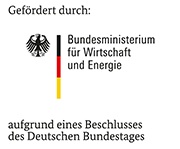18352 N

| Period: | 01.11.1014 - 30.09.2017 |
|---|---|
| Partner: | Biofilmcenter University Duisburg-Essen |
| Funder: | AiF |
| Project Manager: | M.Sc. David Holuscha |
| Research Group: | Corrosion |
Project
Many corrosion damage cases are associated with microbiological activity. Microbial biofilms and the extracellular polymeric substance (EPS) they excrete can both induce (MIC) and inhibit (MICI) corrosion processes. Both effects are particularly influenced by the interactions between the material and the EPS. Decisive here are functional groups such as glucuronic acid or carboxylic acid residues that appear to be also critical for cell adhesion.
In the precursor project 16953 N biogenic cyclodextrins were studied within the meaning of EPS analogous substances as a starting point for a modern and environmental friendly method of corrosion protection for metals in aqueous medium. By surface spectroscopic methods the adsorbate could be identified as polymerized cyclodextrins. Furthermore, the results suggest that the reaction of carboxyl and / or hydroxyl functional groups with dissolution products, which are released at the anode, affects a covering or blocking of these electrochemically active areas. Layers of correspondingly functionalized cyclodextrins could reduce the attachment of harmful microorganisms briefly by up to 90%. As electrochemical studies prove, the layers also show a protective effect during abiotic corrosion.
The aim of this research project is the consistent further development of cyclodextrins. The layers are optimized to (a)biotic corrosion of (un)alloyed steel with regard to their corrosion-inhibiting effect; also their long-term stability should be increased.
back

Das IGF-Vorhaben Nr. 18352 N der Forschungsvereinigung DECHEMA e.V., Theodor-Heuss-Allee 25, 60486 Frankfurt am Main wurde über die AiF im Rahmen des Programms zur Förderung der industriellen Gemeinschaftsforschung (IGF) vom Bundesministerium für Wirtschaft und Energie aufgrund eines Beschlusses des Deutschen Bundestages gefördert.